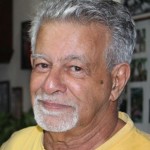The Obsession With A “Sri Lankan Identity”
By Emil van der Poorten -September 1, 2013
To say that reams of paper, or the equivalent in electronic publication, have been used in belabouring what is or is not our “national identity” would be to seriously understate what has been happening in this country, particularly since the end of the war with the Liberation Tigers of Tamil Eelam (LTTE).
One of the greater absurdities was the “abolition of minorities” that the President proclaimed at one of the early triumphalist gatherings. One did not need to have anything resembling academic credentials in any discipline to realise that this was nothing but political sloganeering at best and an attempt to homogenize Sri Lanka in a manner that the Rajapaksa Regime thought fit, at worst, neither in any way acceptable.
What is particularly bemusing is the fact that, pretty well without exception, those who are talking about national unity, the diversity of Sri Lanka’s population and a whole other blather of terminology that I daresay even they do not have so much as a dictionary understanding of, more often than not are driven by a level of insincerity that boggles the mind.
One thing that has struck me as relevant in this discussion about “national identity” is the fact that three members of the Rajapaksa family have, not to put too fine a point on it, absolute political and fiscal control of Sri Lanka. The relevance of that fact to this discussion will be evident to anyone who continues to read this submission to its end.
Morality Of Navi Pillay’s Visit
 United Nations High Commissioner for Human Rights, Navinethem Pillay is now in Sri Lanka. For Tamil separatists and the opposition, she is the savior. Some ministers have rushed to make announcements expressing their confidence in the High Commissioner for her impartiality. However, nationalists are against her visit for several reasons. It is our duty to place the rationale for our protest before the public as well as Pillay.
United Nations High Commissioner for Human Rights, Navinethem Pillay is now in Sri Lanka. For Tamil separatists and the opposition, she is the savior. Some ministers have rushed to make announcements expressing their confidence in the High Commissioner for her impartiality. However, nationalists are against her visit for several reasons. It is our duty to place the rationale for our protest before the public as well as Pillay.
Pillay is the Chief Executive of the United Nations Human Rights Council (UNHRC) which passed two resolutions against Sri Lanka in this year and the last year. According to the resolution passed this year, she should present an oral update to the UNHRC at its 24th session and a comprehensive report at its 25thsession on the implementation of the UN resolution by Sri Lanka. Hence, this is a fact finding mission on how best Sri Lanka has implemented the resolution passed by the UNHRC.
The UNHRC resolutions against Sri Lanka have alleged that Sri Lanka had violated international humanitarian and human right laws during the last stage of the war by committing war crimes on Tamil civilians. These resolutions primarily based on the report produced by a panel appointed by the Secretary General of UN, Ban-ki Moon. The panel consists of three members, namely, Marzuki Darusman, Yasmin Sooka and Steven Ratner. This panel leveled several serious allegations against Sri Lanka including killing of 40,000 Tamil civilians. Hence, Pillay is duty bound to report to the council the veracity of the report of Moon’s panel.
Pillay is not only a lawyer but an ex-judge in South Africa. Sri Lanka and South Africa are the only countries in the world which practice Roman Dutch Legal system. Hence, she must be familiar with natural justice principles. One of such principles is Nemo iudex in cause sua in Latin, meaning no person can judge a case in which she has an interest. That is because justice must not only be done but must be seen to be done. Pillay has grossly violated this principle.Read More


